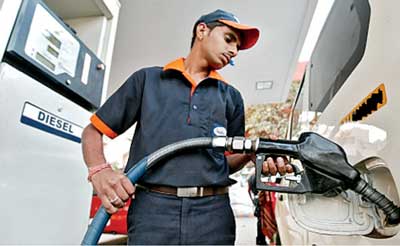Thursday Feb 19, 2026
Thursday Feb 19, 2026
Friday, 2 September 2016 00:26 - - {{hitsCtrl.values.hits}}
 The Ceylon Petroleum Corporation and Lanka IOC Plc have been dealt a double whammy of back-to-back hikes in taxes, increasing their cost and threatening financial viability, though the Finance Ministry thinks otherwise.
The Ceylon Petroleum Corporation and Lanka IOC Plc have been dealt a double whammy of back-to-back hikes in taxes, increasing their cost and threatening financial viability, though the Finance Ministry thinks otherwise.
Last week the Finance Ministry slapped a 333% increase in excise duty on the import of diesel i.e. from Rs. 3 to Rs. 13 per litre. This was on top of increasing the customs duty in June by over 60% from Rs. 9 per litre to Rs. 15 per litre. Whilst the Finance Ministry didn’t go public with its June hike, in a statement on Friday it justified the raise in excise duty.
“Crude oil prices in the world market have declined and the Government has revised the production tax on diesel in order to claim the advantage from the world oil price decline,” the Finance Ministry said.
It assured the public the market price of diesel would not be increased due to the new tax revision.
In the first quarter of FY17, LIOC’s revenue rose to Rs. 19 billion from Rs. 17.4 billion a year earlier. Gross profit saw a four-fold increase from Rs. 852 million to Rs. 3.3 billion whilst operating profit amounted to Rs. 2.2 billion, up from a mere Rs. 94 million a year earlier. After tax profit at LIOC in the first quarter of FY17 was Rs. 2 billion in comparison to Rs. 171 million a year earlier.
Despite this apparent windfall, prospects from the third quarter looked bleak. CPC and LIOC are irked by the double whammy. The oil firms’ survival came from diesel as petrol supplies were loss-making. Following the new moves, effective taxation on diesel has increased to around 35% while the tax on petrol remains at a high 56%.
They maintained that unless the retail diesel price was revised, financial viability would be seriously impacted. Given its over 80% market share, the biggest loser will be the state-owned CPC.
Whilst the latest data isn’t available for CPC, stock broking firm Bartleet Religare estimated LIOC’s profit will decline by Rs. 750 million each quarter due to the new taxation. It also said that the annual cost of diesel will increase to Rs. 7.09 billion from Rs. 6.34 billion. Last year LIOC sold Rs. 7.12 billion worth of diesel.
In FY16, the growth in diesel sales at LIOC was 13% as compared to the industry growth of 5%.
LIOC’s performance was upheld by increased profitability from diesel products particularly in the third and fourth quarters of the year, as international oil prices declined substantially. However, increased taxation on petrol sales together with the reduction in retail prices adversely affected the performance of petrol products.
The company’s gross profit margin improved to 8% in FY16 from 6% in the previous year reflecting the company’s sourcing efficiencies as well as the decline in global oil prices. The operating profit margin improved to 3.6% from 2.6% in FY15.
With the latest revisions, LIOC’s margins are expected to worsen unless price adjustments are made. Industry analysts noted that oil prices in the world market had been between $ 40 and $50 per barrel and a breakeven is only possible if they dip to below $ 40.
During its election campaign, the unity government promised to restore automatic price revisions whilst soon after assuming office retail prices were reduced in tandem with a dip in global trends. The industry has been yearning for the swifter implementation of the Government’s election promise.
Reuters reported this week that oil prices fell more than 70% from 2014 highs earlier this year and were still more than 50% below those levels as a fierce battle for market share between major producers has flooded the world with oil.
Yesterday Brent crude futures added 0.4% to $ 47.08 per barrel, after falling 2.8% overnight but still gaining 11% for August. US crude rose 0.5% to $ 44.92 after shedding 3.6% on Wednesday. It still gained more than 7% for the month.
In May crude oil price was 48.84 per barrel, down by 22% from a year earlier. As per Singapore market prices, diesel was $ 55.42 per barrel and petrol was $ 57 per barrel. Sri Lanka’s fuel imports in 2015 declined to $ 2.7 billion from $ 4.5 billion in 2014 as international prices declined and overall import volumes also declined due to lower dependency on thermal power.
However, the increased number of vehicle imports and strong demand for transport services served to drive overall demand for auto fuels in the country.